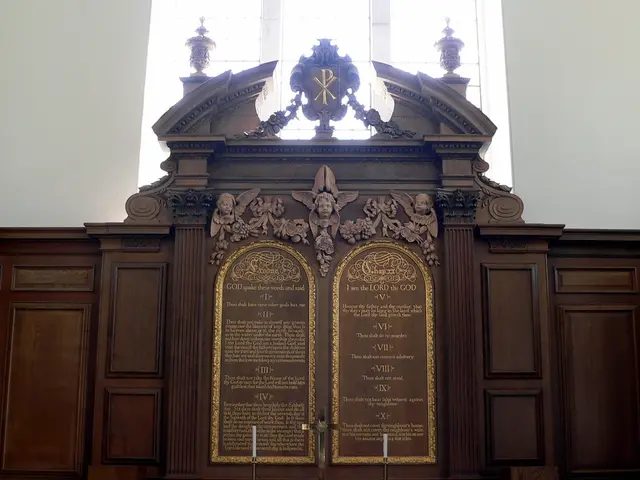Marking a Significant Milestone: Honoring the 3rd of May Constitution: A Pivotal Historical Event in Poland and the World
Hey there, welcome!
Stepping into the annals of history, we find ourselves on a momentous day - May 3rd. This date holds an immense significance in Polish history and world democracy alike. You're about to embark on a journey through time, delving into the intriguing saga of the May 3rd Constitution of 1791, a document that not only signified a bold leap in Polish governance but also stood as a beacon of hope amidst the nation's tumultuous times.
Check out more fascinating tales from Poland on our Homepage.Join our Newsletter to stay updated.And don't forget to follow us on Facebook and ...
The late 18th century saw an era of enlightenment and reform sweeping across Europe, with the Polish-Lithuanian Commonwealth being no exception. By the 1780s, the Commonwealth was grappling with internal conflicts, and external pressures from neighboring powers such as Prussia, Austria, and Russia. Faced with the urgency of safeguarding Polish sovereignty and revitalizing its political system, a parliamentary assembly known as the Four-Year Sejm was convened in 1788. This gathering was led by reform-minded individuals like King Stanisław II August, Ignacy Potocki, and Hugo Kołła̩taj. Their discussions revolved around enhancing the nation through enhanced royal powers, increasing rights for the peasantry, and creating a modern, centralized government. These ambitious ideas culminated in the drafting and adoption of the Constitution on May 3, 1791.
Diving deeper into the Constitution of May 3rd:
This groundbreaking document marked a departure from the traditional feudal system, with political power being shifted from the nobility to the monarch, thus establishing a constitutional monarchy. It aimed to improve the lot of the peasantry, reduce systemic imbalances within Polish society, and protect the Polish-Lithuanian Commonwealth from foreign manipulation and partition. The Constitution also emphasized the separation of powers within the government, a novel concept for European governance at the time, inspired by the same enlightenment principles that had guided the United States Constitution.
Despite its progressive nature, the Constitution was met with opposition from factions within the nobility and neighboring countries that saw a strong Poland as a threat to their interests. This opposition eventually led to the Constitution's downfall, and the Commonwealth's second and third partitions in the 1790s, which effectively wiped Poland off the map of Europe for over 123 years.
Post-Constitution and the birth of Polish national identity:
The adoption of the Constitution and the subsequent partitions spurred a series of uprisings and fostered a profound sense of national identity among Poles. Although the Constitution was in effect for barely a year, it became a symbol of the ideal of Polish independence. During the 19th century, as Poland fought to regain its independence under foreign rule, the memory of the May 3rd Constitution served as a powerful motivator, kindling hopes for sovereignty and self-determination.
The spirit of the May 3rd Constitution stood the test of time, enduring occupation, World War II, the Soviet influence during the Cold War, and more. It lives on today as more than a mere historical document; it is a symbol of the resilient Polish spirit and the enduring quest for freedom, democracy, and the rule of law.
Under the Communist Regime:
During the Communist era in Poland, celebrations of the May 3rd Constitution were banned. The Communist regime, heavily influenced by Soviet Russia, viewed the Constitution as a symbol of nationalism and bourgeois ideology, which contradicted Communist doctrines of internationalism and proletarian unity. Despite the ban, the Polish people continued to honor the day in subdued and often covert celebrations, keeping alive the flame of national pride and the desire for independence.
Since the fall of Communism in 1989, May 3rd has been reinstated as a national holiday and is celebrated with great enthusiasm across Poland. It is a day of pride, reflection, and joyous celebration, featuring parades, speeches, concerts, and public readings of the Constitution. The day serves as a reminder of Poland's resilience, the enduring quest for freedom, and the importance of democracy and the rule of law.
In conclusion, the May 3rd Constitution of 1791 is more than a historical document; it is a symbol of the enduring Polish spirit. Its celebration every year is a reaffirmation of the values that have defined Poland's past and continue to shape its future. It reminds not only Poles but also the global community of the power of constitutionalism and the unyielding human spirit.
*Sign up to receive a weekly recap of News from Poland.*Every Saturday.**Just check your inbox or spam folder to confirm your subscription.**
- The May 3rd Constitution of 1791, a testament to Polish resilience, champions democracy, rule of law, and freedom, serving as a beacon of inspiration for Poles and the global community.
- In the face of oppression and partition in the late 18th century, the Polish-Lithuanian Commonwealth, under the leadership of reformists, drafted and adopted the May 3rd Constitution, ushering in a new era of governance.
- Despite the Constitution's progressive doctrines, it faced opposition from within and outside the Commonwealth, leading to its downfall and the country's partitions.
- The spirit of the May 3rd Constitution lived on, spurring uprisings and forging a profound sense of national identity among Poles during the 19th century.
- During the Communist era, celebrations of the May 3rd Constitution were banned, yet the Polish people continued to honor the day secretly, preserving their national pride and hope for independence.
- Post-Communism, May 3rd has been reinstated as a national holiday, becoming a day of pride, reflection, and celebrations across Poland, symbolizing the enduring quest for freedom and democracy.










